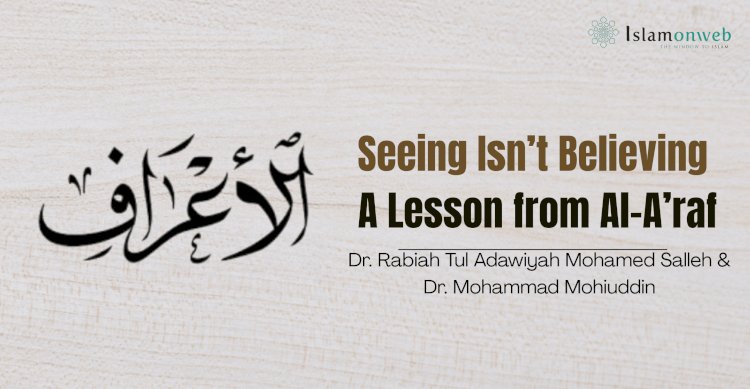Seeing Isn’t Believing: A Lesson from Al-A’raf
Growing up with the Qur’an, many of us are captivated by its stories. Have you ever wished you could have been there to witness the angels prostrating to Adam (عليه السلام)? Or to marvel at the magnificent palaces of Prophet Sulaiman (عليه السلام), built for him by the jinn under his command?
We often think that if we could just see a miracle with our own eyes, our faith (iman) would become unshakeable.
Yet, the Qur’an reveals a startling truth about human nature that turns this assumption on its head. In Surah Al-A’raf, verse 138, we find a story that should stop every believer in their tracks and challenge the age-old assumption that seeing is believing:
وَجَـٰوَزْنَا بِبَنِىٓ إِسْرَٰٓءِيلَ ٱلْبَحْرَ فَأَتَوْا۟ عَلَىٰ قَوْمٍۢ يَعْكُفُونَ عَلَىٰٓ أَصْنَامٍۢ لَّهُمْ ۚ قَالُوا۟ يَـٰمُوسَى ٱجْعَل لَّنَآ إِلَـٰهًۭا كَمَا لَهُمْ ءَالِهَةٌۭ ۚ قَالَ إِنَّكُمْ قَوْمٌۭ تَجْهَلُونَ
And We took the Children of Israel across the sea; then they came upon a people intent in devotion to [some] idols of theirs. They [the Children of Israel] said, “O Moses, make for us a god just as they have gods.” He said, “Indeed, you are a people behaving ignorantly.” (Al- A’raf 7:138)
This is the story of the Bani Israel, moments after experiencing one of the greatest miracles in history. And yet, their first impulse upon seeing other people’s customs was to ask for an idol of their own.
Their shocking request offers a timeless lesson on human psychology, the power of our environment, and the constant, internal struggle to preserve our faith. It forces us to ask a difficult question: Is seeing really believing?
A Miraculous Escape, A Mind-Boggling Request
Let’s set the scene. The Bani Israel, enslaved for generations by a tyrant who claimed divinity, are on the verge of freedom. But escape seems impossible. Behind them, Fir’aun’s army is closing in for the kill. Before them lies the vast, impassable sea. It is a moment of absolute despair.
Then, by Allah’s command, Prophet Musa (عليه السلام) struck the sea with his staff. The waters split apart, forming towering walls on either side and revealing a dry path. Imagine the awe, the terror turning to hope as they scrambled across. Imagine the relief as they reached the other side, watching those same waters crash down and swallow their oppressors whole.
Surely, we think, such an event would engrave faith onto their hearts forever.
And yet, it didn’t. Shortly after this divine rescue, they encountered a community worshipping idols. Instead of holding tighter to the One God who had just saved them, they turned to Musa (عليه السلام) with their unbelievable request: “Make for us a god just as they have gods!”
How could they forget so quickly? Prophet Musa’s (عليه السلام) rebuke was swift and sharp, calling them “a people behaving ignorantly.” This verse powerfully illustrates that even the most spectacular, eye-witnessed miracle cannot guarantee lasting faith.
Why Seeing Isn’t Enough: Four Insights into Human Nature
Their request wasn’t just a momentary lapse. It reveals predictable patterns of human psychology that we can still see in ourselves today.
- The Ghost of Old Habits: The Israelites had lived for generations in Egypt, a land saturated with idol worship. This environment shaped their mental schemas, the default patterns of thinking we use to understand the world. For them, worship was linked to something tangible and visible. Overcoming such deeply ingrained thinking requires continuous, conscious effort. Before they could fully internalise the reality of The One Absolute God, the old ways had to be actively unlearned.
- The Fear of Missing Out (FOMO): Social pressure is one of the most powerful forces shaping our behaviour. When the Israelites saw another community openly devoted to their idols, they felt a pull to conform. It’s the ancient version of what we now call FOMO, the anxiety of being left out of a shared experience. Returning to a familiar (even if it’s wrong) practice can feel safer and easier than holding firm to a new path, even one guided by truth.
- The Fragile Nature of Memory: Human memory is not a perfect video recording. It’s very selective and fades over time. The overwhelming awe the Israelites felt at the parting of the sea likely weakened as they journeyed on and faced new daily struggles. We do this ourselves. For example, the spiritual high of Ramadhan can fade, and the impact of a moving lecture can diminish by the next day. Memory alone is not enough to sustain faith; it must be refreshed with consistent remembrance (dhikr), reflection, and gratitude.
- The Power of Language to Shape Reality: The words we use don’t just describe our world; they build it. Having been immersed in a polytheistic culture, the Israelites’ language and concepts were molded by it. Their request to “make for us a god” shows a mindset where divinity is something that can be manufactured. It reveals a huge misunderstanding of Allah as Al-Khaliq (The Creator), who is beyond human invention.
A Deeper Look: What the Scholars Revealed
Classical commentators of the Qur’an (mufassirun) like Ibn Kathir and Al-Tabari shed even more light on this verse. They explain that this event happened after Allah had not only saved Bani Israel but granted them comfort and prosperity. It was in this state of ease that their ignorance began to show.
Imam Ibn Jarir Al-Tabari notes that the people they encountered may have been from the Canaanites or the Lakhm tribe. He makes a chilling observation: they were worshipping idols made in the shape of cows. This detail foreshadowed the Israelites’ later, infamous sin of worshipping the golden calf while Musa (عليه السلام) was away. It shows how a seemingly small, “ignorant” request was the seed for a much greater deviation.
The specific Arabic wording of their request is incredibly revealing:
ٱجْعَل لَّنَآ إِلَـٰهًۭا كَمَا لَهُمْ ءَالِهَةٌۭ
ٱجْعَل (ij’al): A command meaning “make” or “create.” By using this word, they revealed their flawed belief: that a god is something you can build, like a piece of furniture.
إِلَـٰهًۭا (ilahan): The word for “a god” is in its indefinite form. It implies, “Just give us any god; it doesn’t matter which.” This shows how little they understood the concept of Tawhid, the absolute Oneness and Uniqueness of Allah.
كَمَا لَهُمْ ءَالِهَةٌۭ (kama lahum aliha): “just as they have gods.” This is the language of imitation. Their standard for truth was not divine revelation but simply social comparison.
Their own words exposed a worldview still trapped in idolatry, showing us that a miracle can be witnessed by the eyes but rejected by a heart and mind still clinging to old ways.
From Their Story to Our Lives: How to Fortify Our Faith
The story of Bani Israel is not just about them; it’s a mirror for us. It teaches us that iman is not a destination we arrive at after one magnificent experience. It requires constant tending. Here’s how we can apply these lessons:
- Move Beyond Memory to Active Remembrance: Instead of relying only on the memory of past spiritual moments, we should actively engage in daily dhikr (remembrance of Allah), reading the Qur’an, and practising gratitude. This keeps the heart connected and prevents faith from fading.
- Seek Knowledge to Unlearn Old Habits: By actively seeking knowledge (ilm), we can replace ignorant cultural habits with a true understanding of Tawhid. The more we learn about who Allah truly is, the less appeal false concepts will have.
- Counter Social Pressure with Righteous Company: The Israelites were swayed by the community they encountered. We must consciously surround ourselves with righteous companions who strengthen our devotion to Allah and remind us of the Hereafter.
- Purify Your Language to Shape Your Reality: Pay close attention to the words you use. Do they reflect a deep belief in Allah’s power and wisdom, or do they echo the language of despair of the culture around you? Our words shape our beliefs.
The Qur’an does not ask us to wish for parted seas or other grand miracles. It calls us to reflect on the stories it has already given us, to internalise their lessons, and to let them shape our hearts, our words, and our lives.
True faith is not born from simply witnessing spectacular sights. It is nurtured through a lifetime of conscious effort, humble reflection, and a steadfast connection to the Creator.
About the author:
DR. Rabiah Tul Adawiyah Mohamed Salleh is an Assistant Professor of Linguistics at the Department of English Language and Literature, Kulliyyah of Islamic Revealed Knowledge and Human Sciences (AHAS KIRKHS), International Islamic University Malaysia. She teaches psycholinguistics at both undergraduate and postgraduate levels. Dr. Rabiah is a strong advocate for the decolonisation and Islamisation of knowledge within language studies.
DR. Mohammad Mohiuddin is an Assistant Professor at the Department of Quran and Sunnah Studies, AbdulHamid AbuSulayman Kulliyyah of Islamic Revealed Knowledge and Human Sciences, International Islamic University Malaysia. He teaches and conducts research in the areas of Quran and Sunnah Studies, Islamic Ethics, Fiqh of Contemporary Issues, Islamic Worldview, Shariah and Islamic Banking, Islamization of Knowledge, and related fields.
Disclaimer
The views expressed in this article are the author’s own and do not necessarily mirror Islamonweb’s editorial stance.
























Leave A Comment